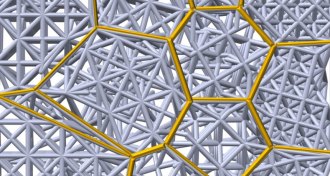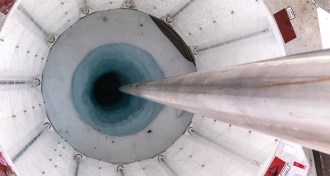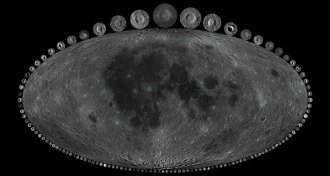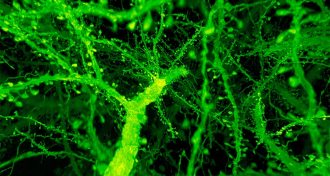Uncategorized
-
 Planetary Science
Planetary ScienceRing ripples reveal how long a day lasts on Saturn
Clues in Saturn’s rings divulge the planet’s rotation rate: 10 hours, 33 minutes, 38 seconds.
-
 Materials Science
Materials ScienceBeing messy on the inside keeps metamaterials from folding under stress
Inspiration from disordered arrangements of atoms in crystalline metals may lead to longer-lasting, next-gen materials.
-
 Health & Medicine
Health & Medicine‘Good to Go’ tackles the real science of sports recovery
In ‘Good to Go,’ science writer Christie Aschwanden puts science — and herself — to the test for the sake of sports recovery.
-
 Physics
PhysicsPhysicists aim to outdo the LHC with this wish list of particle colliders
Proposed new accelerators could solve mysteries of the Higgs boson.
-
 Archaeology
ArchaeologyOur fascination with robots goes all the way back to antiquity
In the book ‘Gods and Robots,’ a scholar recounts how early civilizations explored artificial life through myths.
By Bruce Bower -
 Animals
AnimalsCryptic remains of tiny animals have turned up in an Antarctic lake
Researchers were surprised to find vestiges of what appear to be tiny animals in mud from Antarctica’s ice-covered Lake Mercer.
-
 Agriculture
AgricultureProsecco production takes a toll on northeast Italy’s environment
The soil in Northern Italy’s prosecco vineyards is washing away.
-
 Animals
AnimalsThis honeybee parasite may be more of a fat stealer than a bloodsucker
Inventing decoy bee larvae prompts a back-to-basics rethink of a mite ominously named Varroa destructor.
By Susan Milius -
 Physics
PhysicsA new gravitational wave detector is almost ready to join the search
Buried deep underground, Japan’s KAGRA detector relies on components cooled to just 20 degrees above absolute zero.
-
 Planetary Science
Planetary ScienceThe moon’s craters suggest Earth hasn’t erased lots of past impacts
A new look at moon craters suggests the Earth and moon suffered more impacts in the last 290 million years, and the Earth retains its biggest scars.
-
 Neuroscience
NeuroscienceNew ways to image and control nerve cells could unlock brain mysteries
Methods that target single nerve cells in mice and fruit fly brains are starting to tease apart the brain’s complexity.
-
 Health & Medicine
Health & MedicineOverdose deaths tied to antianxiety drugs like Xanax continue to rise
Benzodiazepines, widely used but addictive drugs to treat anxiety and insomnia, are contributing to a growing number of overdose deaths.